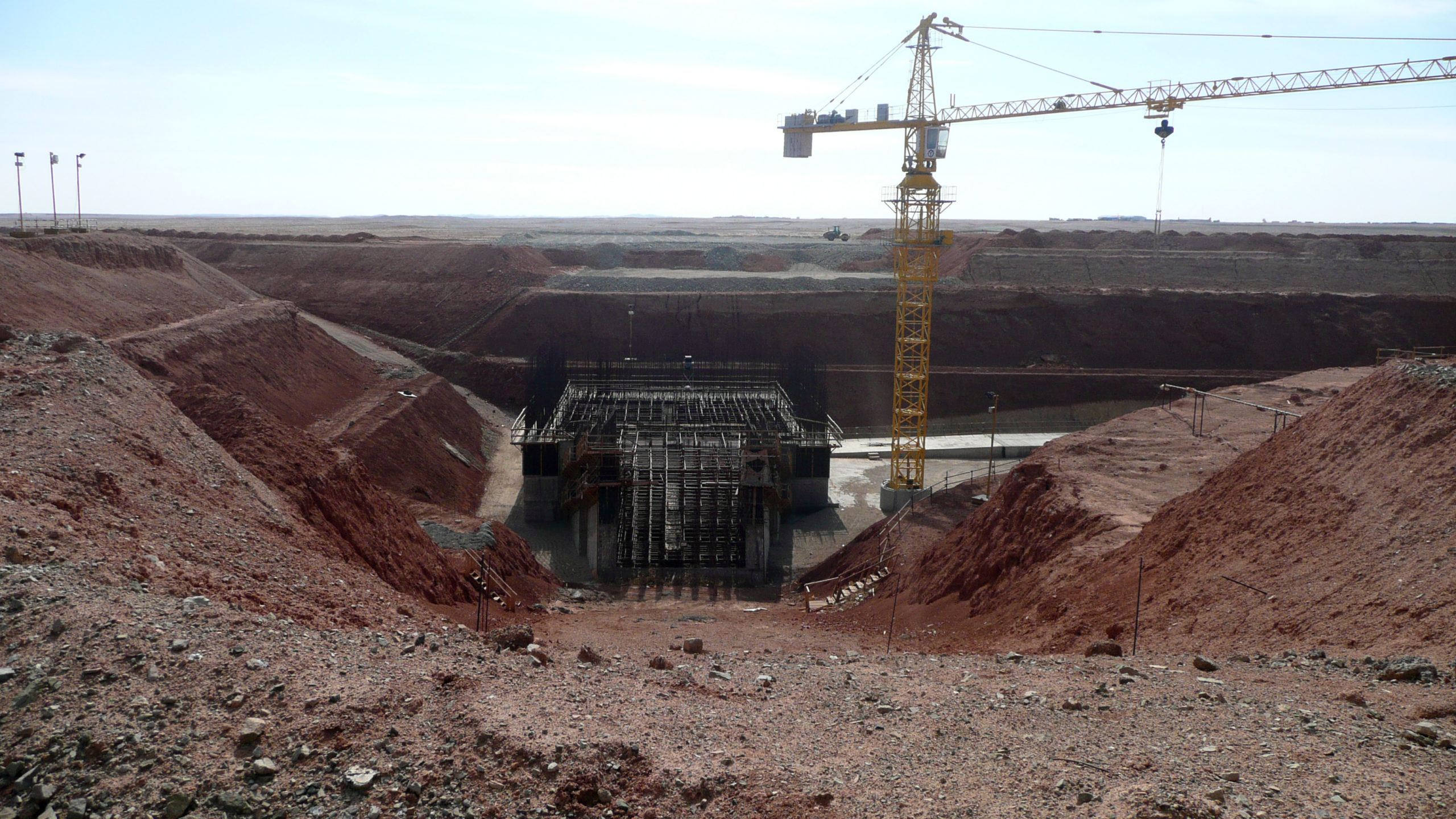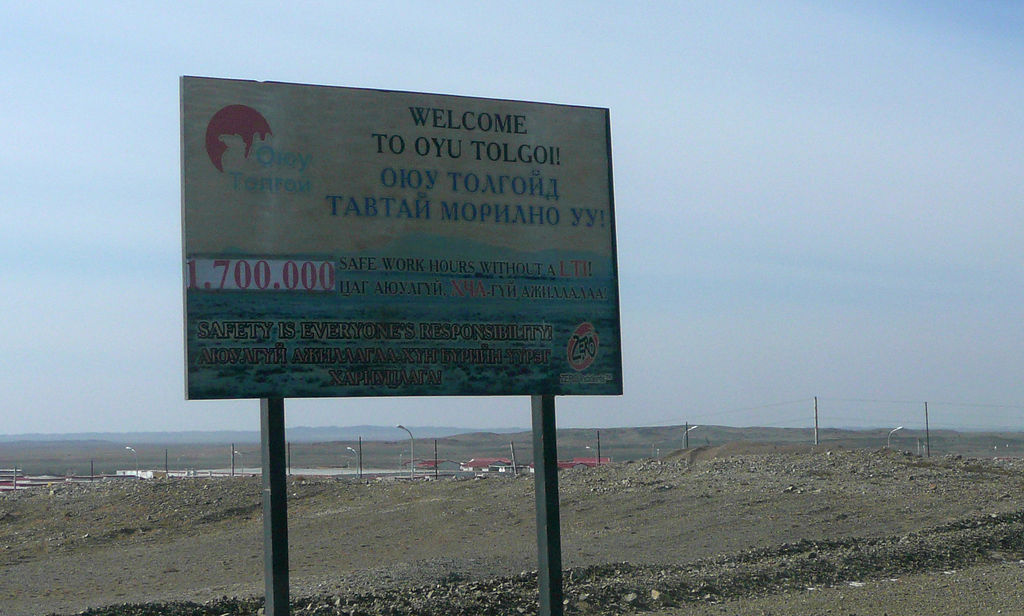Over the last decade, Mongolia’s Oyu Tolgoi mine has become synonymous with abusive business and mining practices that have displaced Mongolian herders, causing outrage among environmentalists and rights organizations in the South Gobi desert.
A massive underground expansion that will make Oyu Tolgoi one of the largest copper and gold mines in the world is underway, despite Rio Tinto’s announcement over the summer that the mine would require redesign. With over eighty percent of the mine’s value found underground, and over 200km of planned underground roads and infrastructure, the mine is now entering its most profitable phase.
Oyu Tolgoi’s majority owners, British-Australian company Rio Tinto, and Rio Tinto’s Canadian subsidiary Turquoise Hill Resources, have long exploited Mongolia’s lax environmental and economic regulations. Access to water and land, resource colonialism, and government corruption are ongoing issues that have led to sustained conflict. Despite ongoing criticism of the mine’s contracts and claims of corporate tax evasion, Mongolia’s government has persisted in granting dangerous concessions to the company.
Mongolian nomadic herders continue to struggle against Oyu Tolgoi’s disregard of their traditional rights to free-flowing rivers and pastures in the Khanbogd soum, the region in the southeastern Ömnögovi Province most directly affected by the mine.

A coalition of herders, represented by the Mongolian NGOs Gobi Soil and Oyu Tolgoi Watch, submitted a complaint to the International Finance Corporation (IFC) in 2012, during the mine’s open-pit phase.
The complaint describes the mine’s destructive impacts, including the forced relocation of herding communities. Herders raised the alarm that diversion of the Undai River and the sacred Bor Ovoo spring would “deplete local water sources, deteriorate pastureland, and threaten the community’s spiritual practices.” Access to fresh water in Khanbogd remains limited, as much of it is prioritized for use by the mine.
Oyu Tolgoi’s expropriation of land and construction of fences for the mining license area has forced herders onto one another’s pastures, which are now tight and overpopulated. Soil and vegetation are covered by dust from the mine, and are no longer able to naturally regenerate with the healthy migration of herds. This has also caused horses, camels, goats and sheep on which the herders rely to become sick, creating a vicious cycle of intergenerational impacts for families.
Since the 2012 complaint to Oyu Tolgoi’s lenders, the mine’s owners have failed to deliver on promises of remediation, despite negotiating two agreements in March 2019 with the IFC’s Compliance Advisor Ombudsman. Sukhgerel Dugersuren, the head of Oyu Tolgoi Watch, described the early negotiation process as tainted by conflicts of interest, with local business owners acting as “elected herder representatives.”
A report published last year by the Accountability Council found that only about a third of the mine’s commitments can be considered “complete or well underway.”
“Oyu Tolgoi [OT] and its lenders continue to resist [carrying] out an environmental and social impact assessment of the underground mine phase,” said Sukhgerel in an email interview with Toward Freedom. “Herders continue to demand that OT carry out an environmental and, most importantly, a social impact assessment of underground mine and take control of its sub-contractor’s non-compliant actions on the ground.”
Paul Robinson, a researcher with BankWatch who is the director of the Southwest Institute, has been working with Oyu Tolgoi Watch and Mongolian herders for over ten years. In a Skype interview, Robinson described how the mine initially lacked a land reclamation plan, which, along with the financial assurance to guarantee the plan’s completion, should be standard process.
“They have an environmental social impact assessment that was published in 2012,” said Robinson. “The mine had already started then—they’d been stripping overburden for years. The lack of coherent baseline makes it very difficult to assess their performance.”
Robinson described how agreements between herders and Oyu Tolgoi were slower to be implemented in relation to concerns around tailings facilities in the Undai River watershed. He also mentioned the shoddy construction of 37 wells that were supposed to monitor the separation of the upper and lower aquifer. Oyu Tolgoi’s subcontractors constructed these wells with gravel instead of concrete, causing the upper level of water (which was to be used by herders) to drain into the deeper groundwater that is used by the mine.
“There’s been no hydrological analysis of the Oyu Tolgoi area to monitor the overall water levels and to address these wells,” said Robinson. “The wells were fixed, according to Oyu Tolgoi, but there’s no analysis of the consequences.” The total number of wells drilled falls far short of what was initially promised.
With the underground expansion underway, Khanbogd herders are still struggling to access and understand the compensation they are being offered by Oyu Tolgoi as it relates to the mine’s open-pit phase. The absence of meaningful economic alternatives to herding combined with the irreparable damage to their land has forced herders into dependency, circumstances the Accountability Council describes as “desperate.”
The bigger picture: austerity and tax evasion
Oyu Tolgoi has been an important vehicle of neoliberal intervention and accelerated the privatization of Mongolian land and resources. Rio Tinto and Turquoise Hill claim that the mine is a “national treasure” that is “contributing to the prosperity of Mongolia.” However, until the country pays off the loan from Turquoise Hill that financed the government’s 34 per cent share in Oyu Tolgoi, Mongolia won’t see substantial profits from the mine.
Mongolia has been under strict austerity measures following a $5.5 billion bailout by the International Monetary Fund (IMF) in 2017. The IMF bailout pressures Mongolia to privatize public assets and enforce free-trade policies. The country remains saddled with an external debt of $29.37 billion.
The influence of the mining lobby has significantly shaped Mongolia’s economic and energy policies. Armando Torres, CEO of Oyu Tolgoi LLC, is a director at the Business Council of Mongolia, which has been instrumental in lobbying for corporate tax reforms favorable to the extractive industry, including new measures announced in June 2019, which took effect on the first day of 2020.
These new tax reforms include a significant drop in withholding tax rates, which mining companies are known to exploit. The Ottawa-based Intergovernmental Forum on Mining, Minerals, Metals and Sustainable Development describes this kind of taxation policy as an “added incentive for a company to load up the mine with debt, as well as charge above-market interest rates to reduce local taxes and shift profits overseas.”

In July 2019, Rio Tinto announced an unprecedented delay of 16-30 months, estimated to cost up to $1.9 billion, raising the mine’s total cost to $7.2 billion. Citing “stability risks” and more challenging ground conditions than expected, Rio Tinto estimates that this delay may require the relocation or removal of “critical underground infrastructure, such as the mid-access drive and the ore handling system.”
No doubt the new tax arrangements are also appealing for Rio Tinto and Turquoise Hill, as the mine’s owners have repeatedly been charged with tax evasion. In 2018, the Centre for Research on Multinational Corporations (SOMO) published a report documenting how Turquoise Hill Resources had set up a network of shell companies in global tax havens, including the Netherlands.
Ambiguity in Mongolian tax laws and the Canadian Revenue Authority’s approval of the shell companies has allowed for substantial corporate tax avoidance. In addition to a $130 million fine in 2015 (which Turquoise Hill settled for only $30 million), the Mongolian Tax Authority fined the Canadian company an additional $155 million for tax evasion in 2018.
The allegations published by SOMO also include an estimated $559 million in Canadian taxes that were effectively avoided when the company shifted profits through a Luxembourg-based shell company Movele.
Erdenebat Bataa, the head of the Economics Department at the National University of Mongolia, confirmed SOMO’s claims that there was “widespread evidence of transfer pricing and other tax evasion strategies.” Erdenebat has written extensively about the danger of the country’s excessive dependence on the extractive industries.
Referring to the unilateral negotiations between the mining companies and the Mongolian government, Erdenebat said he does not expect positive results from mining in Mongolia until “experts with personal and professional integrity” are involved in the negotiations. “…The World Bank’s country economists never bothered cooperating with indigenous economists, nor [did they reply] to many invitations to seminars and events at the Mongolian Economists’ Association and the National University of Mongolia,” wrote Erdenebat in an email interview.
Despite the glaring unfairness of the agreements, Mongolia’s government unanimously approved a resolution in December 2019 that confirmed the validity of all agreements related to Oyu Tolgoi dating back to 2009. Pressure from the IMF and World Bank together with lobbying on the part of the extractive sector, continue to act as barriers to Mongolia’s sovereignty over its own tax legislation and energy priorities, much less to allow the country to protect the traditional land rights of its people.
Author Bio:
Lital Khaikin is an author and journalist based in Tiohtiá:ke (Montréal). She has published articles in Warscapes, Briarpatch, and the Media Co-op, appeared in literary publications like 3:AM Magazine, Berfrois, and Black Sun Lit’s “Vestiges” journal. She runs The Green Violin, a slow-burning samizdat-style literary press for the free distribution of literary paraphernalia.
